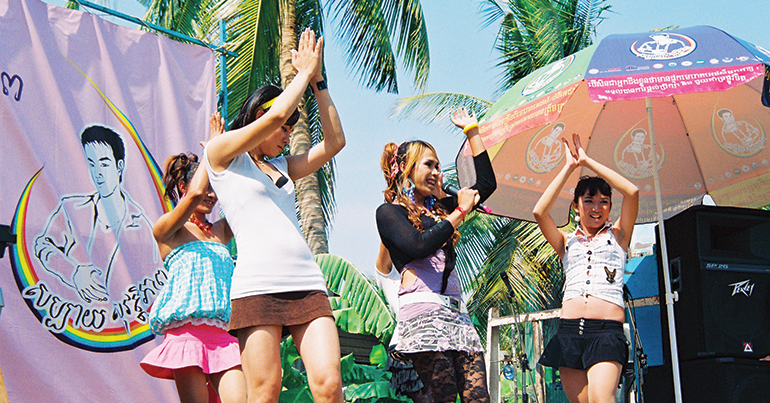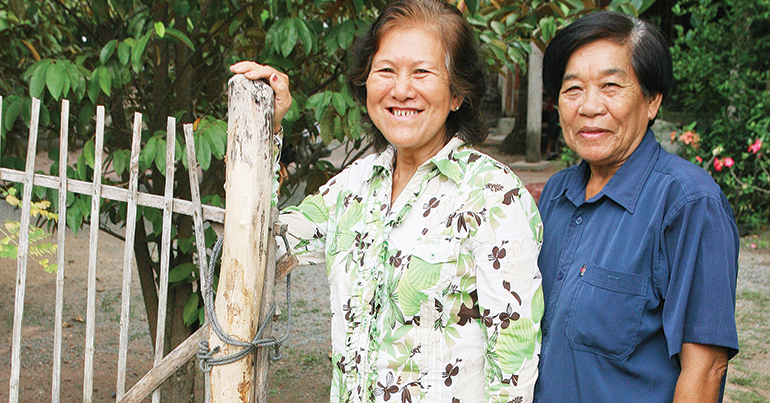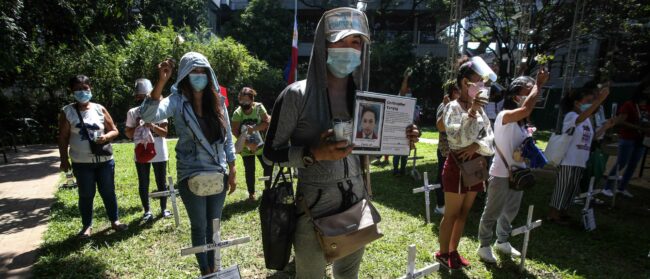As a child, I used to play as a boy,” Doung Sok An explained, fidgeting with the thick gold ring on his finger. “My family didn’t really accept me, but I told them I could not change. So they are kind of accepting of me, but they still want me to be a ‘normal girl’.”
Identifying as male, An would go on to have a string of short-lived relationships with women before meeting his soon-to-be wife, Heang Chanri. Four years later, they work together at a garment factory in Kandal province. Leaning against one another in the shade of a crowded courtyard, the couple seems like any other husband and wife shrinking from the afternoon sun. But under Cambodian law, An is not a man – and Chanri is not his wife.
The push for marriage equality for lesbian, gay, bisexual, transgender, intersex and queer (LGBTIQ) Cambodians has had some powerful proponents over the decades. As far back as 2004, then-King Norodom Sihanouk proclaimed his support for marriage equality after watching TV coverage of same-sex weddings in California. In 2012, Prime Minister Hun Sen – who just five years earlier had publicly disowned his lesbian adopted daughter – called on Cambodians not to discriminate against their LGBTIQ neighbours. And as recently as June last year, numerous political parties declared support for a constitutional amendment on same-sex marriage at a roundtable on LGBTIQ rights.
Unfortunately, the legal status of LGBTIQ, or ‘rainbow’, relationships remains a mystery to many Cambodians, even those actually living within such unions, according to Nuon Sidara, coordinator of the Cambodian Centre for Human Rights’ Sexual Orientation and Gender Identity Project.
“The constitution says that marriage is ‘between a husband and a wife’,” he told Southeast Asia Globe. “In our research [LGBTIQ couples] say that they have the right to get married, to live together, to adopt children, to jointly own property – but this is the wrong understanding. They assume that because they are humans, they should be treated in a manner like any other couple… [But] there’s nothing in our civil courts or constitution to protect same-sex couples.”

For rainbow couples in Cambodia, the distinction is not just a matter of semantics. Unlike those in legal marriages, LGBTIQ couples are unable to jointly own property, be considered their partner’s legal successor under civil law, enjoy the same tax exemptions, be protected by the same domestic violence legislation or enjoy the same rights to legal adoption.
Ly Pisey, coordinator at LGBTIQ rights group Rainbow Community Kampuchea (Rock), said that this lack of legal protection left LGBTIQ Cambodians at risk of being stripped of their livelihood, property and even family in the case of separation from or the death of their partner.
“Some LGBT [people] already experience these bad situations: when someone falls sick, or dies, their family members try to ruin their partner’s lives,” she said. “They cannot go to court – they just give up. And then they become vulnerable again because they’re broke, they have nowhere to go and they become unemployed and cannot reclaim their property or be with their own child.”
As a short-term solution, Rock advocates for rainbow couples to enter into a specially prepared civil contract detailing the nature of the relationship to be signed and witnessed by local commune officials. The organisation’s advocacy and communication officer, Cheyleaphy Heng, described the document as a way of providing local officials and law enforcement officers with a greater understanding of rainbow couples and their rights.
“We have two goals from this document,” she said. “One is that when they have an issue, they have this contract to show that they have been together for, let’s say, five years, and they have been earning incomes and they’ve adopted children. Now let’s say they split up – they should divide it equally. And the second is greater recognition in the local area, where they can say that I got this contract, I promised to be with this person, and we might not be in legal terms as equal as the other couples – but we are a couple.”
“I own a motorbike, I have some savings, I’m taking good care of my wife, so our neighbours even admire me for being a gentleman”
Doung Sok An
Despite reported support for the nation’s LGBTIQ community from leading officials within the Ministry of Information, Ministry of Justice and the Cambodian Human Rights Committee, there seems to be little appetite for legislative change from leading lights of the ruling Cambodian People’s Party. Both Pisey and Sidara stated that, while they enjoyed positive relationships with key government figures, the reality seemed to be that the catalyst for change would have to come from within the wider Cambodian community rather than the National Assembly.
An said that he saw little leadership coming from the ruling party on marriage law.
“I have only 20% hope of that [political change],” he said. “No one pays any attention to us – they seem to have no interest in recognising us or passing laws on same-sex marriage. Many people still think we just have an infection, a disease – or that we’re all just following a trend.”
For many in Cambodia’s LGBTIQ community, though, there may be a shorter path to marriage than a fully fledged constitutional amendment. Legislation allowing for the official recognition of transgender Cambodians would have wide-reaching effects for the Kingdom’s rainbow couples. In a 2017 field report in which the Cambodian Centre for Human Rights interviewed more than 120 current or former members of co-habiting rainbow couples, more than 99% of respondents self-identified as transgender or gender non-conforming.
While this startling statistic raises deep questions about the persistence of strict gender norms in Cambodian society, more practically it means that legislation officially recognising Cambodians who identify as a gender other than that assigned to them at birth could effectively allow the majority of the nation’s same-sex couples to marry without the constitutional amendment necessary for full same-sex marriage.

In a nation with as starkly defined gender roles as Cambodia, it is a move that, while falling far short of full acceptance of LGBTIQ marriage, may prove more palatable to the broader public in the short term. An and Chanri said that their neighbours, once sceptical, had gradually begun to accept An’s role in their relationship – though only once he had established his credentials as a man who knew how to take care of a woman.
“Before, there were some people who would say that we’re not going to make any progress living as a couple, telling me that I was weak,” An said. “But it’s been getting better recently… I own a motorbike, I have some savings, I’m taking good care of my wife, so they even admire me for being a gentleman and taking better care of my wife than a ‘normal’ man.”
Barred by Chanri’s three children – from a marriage that fell apart more than 20 years ago – from spending the night together at her house, the couple has taken out a mortgage on a plot of land just two kilometres from the infamous Killing Fields at Choeung Ek. It is here that An and Chanri hope to spend the last years of their lives together, free from the judgement of their families.
“We want to live together and grow old together,” An said. “[The dream of a house is] proof that we’re serious about our life as a couple, that we have a goal like other normal couples. I have sacrificed my whole life for our love, even though that love is still not recognised by law. But I am so worried that one day her children are going to force her to give up on me – and leave me with nothing.”


